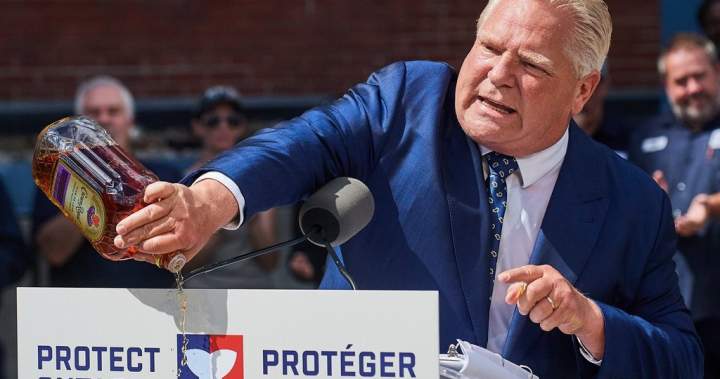Ontario Premier Doug Ford has escalated tensions with major liquor manufacturers, threatening to pull popular brands like Crown Royal and Smirnoff from LCBO shelves if producers don’t increase their production commitments in the province. The confrontation marks a significant turning point in Ontario’s attempt to reshape its alcohol retail landscape.
“We’ve made it very clear to the liquor companies that have bottling facilities here that they need to increase their production or they’re going to be taken off the shelves,” Ford declared during a news conference at Queen’s Park on Thursday. “We’re going to support the companies that support the people of Ontario.”
The ultimatum comes as part of the Ford government’s broader initiative to expand alcohol sales to convenience and grocery stores by next year. This move has created friction with established liquor producers who have expressed concerns about the potential impact on their business models and distribution networks.
Industry insiders report that major manufacturers, including Diageo (producer of Crown Royal and Smirnoff) and other international spirits companies, are being pressured to commit to increased production volumes in Ontario or risk losing their prominent positioning in the province’s dominant liquor retailer. The LCBO, with its network of more than 660 stores, represents a crucial market for these brands.
Finance Minister Peter Bethlenfalvy reinforced the government’s position, emphasizing that the province expects reciprocal support from businesses operating in Ontario. “If you want to do business in Ontario, you need to support Ontario workers and Ontario production,” Bethlenfalvy stated in a separate media briefing.
The Canadian beverage alcohol industry contributes approximately $13 billion to Canada’s GDP and supports over 95,000 jobs across the country, according to industry association Spirits Canada. Ontario represents roughly 40% of this market, making it a critical battleground for producers.
Crown Royal, produced at Diageo’s facility in Gimli, Manitoba, is Canada’s top-selling whisky and a significant export product. The brand’s potential removal from LCBO shelves would represent a major disruption for both the company and consumers who have long considered it a staple product.
Labor unions representing workers at Ontario bottling facilities have expressed cautious support for measures that might increase local production but remain concerned about potential job losses if manufacturers decide to reduce their Ontario footprint rather than expand it.
“We support initiatives that create more good-paying manufacturing jobs in Ontario, but threatening established producers could backfire if companies decide to shift operations elsewhere,” said Warren Thomas, president of OPSEU, which represents LCBO workers.
Industry analysts note that major producers face significant logistical and financial challenges in quickly scaling up production facilities, especially with uncertainty surrounding the government’s broader alcohol retail reform plans.
“These multinational companies operate complex global supply chains that can’t simply be reconfigured overnight,” explained Sylvain Charlebois, director of the Agri-Food Analytics Lab at Dalhousie University. “The threat of delisting popular brands could ultimately hurt Ontario consumers if products become harder to find or more expensive.”
As this high-stakes negotiation unfolds, Ontario consumers are left wondering: Will the province’s push for increased local production ultimately strengthen Ontario’s economy, or will it disrupt access to beloved brands and potentially raise prices in an already strained economic environment?











